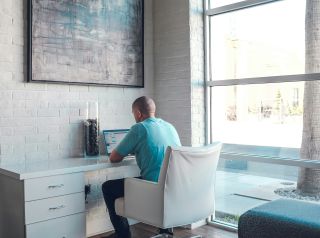Loneliness
The Epidemic of Loneliness
Even post-pandemic, working from home may contribute to feelings of isolation.
Posted February 29, 2024 Reviewed by Michelle Quirk
Key points
- Loneliness has reached epidemic levels, leading countries like the U.K. to create a Ministry of Loneliness.
- While loneliness is usually associated with social isolation, working from home might also be an issue.
- Creating a community with common goals and shared interests can help reduce the sense of loneliness.

Toward the end of 2021, the pandemic finally began to really lift in London, where I live. As it happened, I had just begun working remotely full time in 2019. I was thrilled to have back all my former commuting time on the Tube. But, until the pandemic, working from home didn’t mean I was home all the time. I went to the opera with friends, did triathlons, and met people for dinner—in fact, it seemed like I was out and about even more than when I was at the office. But then the pandemic hit, and I suddenly entered a period of 18 months of near-total isolation.
So when I was out for a walk in late 2021, I was mostly just happy to be out and about again. Then I rounded a corner and suddenly faced the Arthur Murray Dance Studio. Yep—the one that your grandparents probably took classes at for their first “social” or before their wedding. I don’t know why I stopped. But I did. Then I walked on down the street and around the block, because I had zero interest in learning to dance. Then I circled back to the dance studio. Twice. Forty-five minutes later, I went in and signed up for a class. Which was ridiculous, because again, I’m just not the dancing sort.
Since then, I have competed in dance competitions, learned tango during a business trip to Buenos Aires, and trained under a "Strictly Come Dancing" choreographer. I’ve even danced in a filmed promotion about dance (OK, but way in the background). Yep—I not only started dancing, I was soon all in.
We don’t have to go to a workplace, but we still need community
Why did I stop that day? And why have I not stopped dancing since? Because I realized that I was lonely. Nearly two years without the social interactions and connectivity that had always seemed inevitable and organic had completely changed my reality. The fact that I was experiencing loneliness in 2021 wasn’t surprising. (As a psychologist, I would have been more concerned if I wasn’t lonely.) But it was hard to fully appreciate the acute impact of loneliness—especially since it was happening to almost everyone.
In the United Kingdom, a Ministry of Loneliness was created in 2018—even before the surging rates of pandemic-related loneliness. And, in 2023, the U.S. Surgeon General released a report called Our Epidemic of Loneliness and Isolation on the impact of loneliness on everything from mood to cognitive function to physical health. And, although dance lessons were hardly the obvious solution when I stood outside Arthur Murray’s, I discovered something that let me connect with others, challenge me mentally, and even improve my physical self (my trainer says my core strength, balance, and posture are even better than what I achieved from triathlon training).
Loneliness is not new, but work is no longer a respite
I had only started working remotely just before the pandemic, and so the lack of a work-based community was not as noticeable. But what dancing provides for me isn’t unlike a workplace: You all share a common goal, you must coordinate (literally) with others, and you must understand the rules. There are cultural norms and technical terms. There are people who are more experienced and all kinds of rookie dancer mistakes. And, like at a workplace, you build friendships and connect on terms other than the immediate task at hand. Unlike loneliness in our personal lives, loneliness at work—especially when work is no longer in an office space—can be harder to identify. The benefits of working from home can mask some of the costs.
For me, dancing brought back the shared mission and common language that a professional community offers in the workplace. You learn a skill from others, and you practice and receive guidance and (hopefully) improve. I am very happily back at the opera with friends, enjoying dinners out, and seeing loved ones. But dance has possibly resolved a different gap that work once filled.
Workplaces offer community, but they're not the only solution
Loneliness tends to be associated with being alone in social situations (lack of friends, estrangement from family, or unattachment romantically). But, post-pandemic, I (and millions of others) continue to work remotely. Unlike our social community, we have not built back our workplace community, and we might not even realize that it’s gone. This is because historically we didn’t even think about the community that a professional space brings. When you are working on site in an office, or a shop, or a factory, the opportunities to build connections are a natural part of the work environment. With the increasing ability to work from home—which has numerous and significant advantages—we must also create new communities for ourselves. That said, while I write here about my personal experience, I also recently wrote about how employers still have an obligation to create community.
Community is where you make it
We know that working from home can challenge the organic networking and mentoring that develops careers. But it’s important to also build back the community of a workplace and a specific type of loneliness that cannot be solved with our purely social sphere, as important as that is. Where each person finds that space now is up to them. Remember that loneliness is being referred to as an epidemic because it is widespread and a natural response to isolation. Recognizing that no longer going to the workplace might be a contributing factor is a first step in addressing the issue. And although Zoom/videoconferencing is incredibly useful, it doesn’t substitute for the emotional and psychological benefits of being with colleagues in person. On the other hand, you can get those benefits by finding other group live events that create a community. Consider challenging yourself by exploring something new and different. In other words, don’t walk past the dance studio.
References
Kris Bramwell. People fade away without human company. BBC. October 15, 2018.


